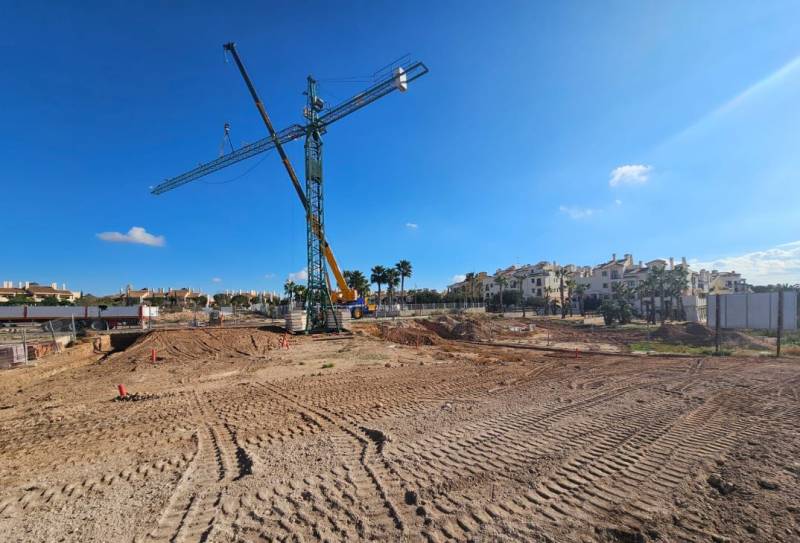Date Published: 23/10/2024
Mar Menor development plan faces further delays, with only one phase completed in four years
ARCHIVED ARTICLE -
Environmental groups and local politicians have expressed frustration as delays continue for the Mar Menor protection plan
The ‘
Plan de Ordenación del Mar Menor’ building plan, which is designed to regulate land use and activities around the
Mar Menor lagoon in Murcia, continues to face significant delays. After four years, the regional government of Murcia has completed only one of six administrative phases necessary to approve the plan, which is aimed at protecting the lagoon’s fragile ecosystem.
This project, named Portmarme, was first outlined in 2020, but slow progress has led to mounting frustration from environmental groups, local politicians and residents.
The plan’s primary goal is to balance conservation efforts with the socio-economic activities that occur in the surrounding Campo de Cartagena region. The Ministry of Public Works has so far only completed a preliminary document that diagnoses the current situation but lacks any specific regulatory guidelines.
Delays and complications
Although the initial draft of the Territorial Planning Plan was completed in December 2022, it was delayed further due to issues with the consultancy team responsible for its creation. When the draft was finally handed over, it was criticised for being vague and lacking concrete proposals for protecting the lagoon. The regional government took an additional eight months to publish the draft, with the final document not becoming available
until August 2023.
The planning process has been slowed down by various administrative steps. Before it can proceed, the current draft must undergo an environmental impact assessment, along with a consultation phase involving regional and municipal bodies. So far, the Ministry of Public Works has promised to conduct a round of consultations in the coming months. However, five more stages remain, including drafting the full plan, public consultation periods, and securing final approval from the Ministry of the Environment.
The Ministry has acknowledged that further phases could also face delays, and no specific deadlines have been given for when the plan might be fully approved.
Criticism from environmental groups and political parties
The slow progress of the Mar Menor plan has provoked an outcry from local environmental groups and politicians alike. Organisations such as
Ecologistas en Acción and
Pacto por el Mar Menor have criticised the regional government for its lack of urgency, accusing them of deliberately stalling the project for political and economic reasons.
Environmental groups allege that the Popular Party (PP), which leads the regional government, delayed the publication of the plan in 2022 to avoid potential electoral fallout. They claim the party was concerned that the environmental restrictions proposed in the plan could harm the interests of influential business owners in the region. Eight environmental groups have called for the resignation of key government officials over the handling of the plan, labelling the delay as “scandalous”.
In response, the PP has insisted that the plan is progressing in line with necessary environmental assessments. They maintain that local municipalities, including
Los Alcázares, were actively involved in the consultation process and were aware of the plan’s development.
Local politicians, especially from the opposition Socialist Party (PSOE), have been vocal in their criticism of the delays. Mario Pérez Cervera, the mayor of Los Alcázares, has called for the urgent publication of the plan, condemning the government for what he described as political gamesmanship.
“The Mar Menor cannot be used as a bargaining chip in political negotiations,” Pérez Cervera said, referring to the power-sharing agreement between the PP and far-right Vox that formed the current regional government. He accused the regional government of prioritising political interests over environmental protection.
Despite assurances from the PP that the plan will be published soon, the PSOE and other political groups remain sceptical. They have repeatedly demanded clear deadlines and greater transparency in the planning process.
The Mar Menor, Europe’s largest saltwater lagoon, has suffered from severe ecological degradation due to decades of pollution, primarily from agricultural runoff. This has caused algal blooms, which have suffocated marine life and led to mass fish die-offs in recent years.
The 2020 law mandating the creation of the Mar Menor development plan included a three-year urban planning moratorium around the lagoon. However, this moratorium expired in 2023, adding to concerns about further environmental degradation. Critics argue that the delays have left the lagoon vulnerable to ongoing damage from unsustainable agricultural and urban practices.
The regional government now faces increasing pressure to finalise and implement the plan to protect the Mar Menor and meet the expectations of both environmental advocates and local communities. While the regional government has promised that progress is being made, the slow pace of the project means that the Mar Menor’s future remains uncertain.
Image: Pacto por el Mar Menor
article_detail

|






































